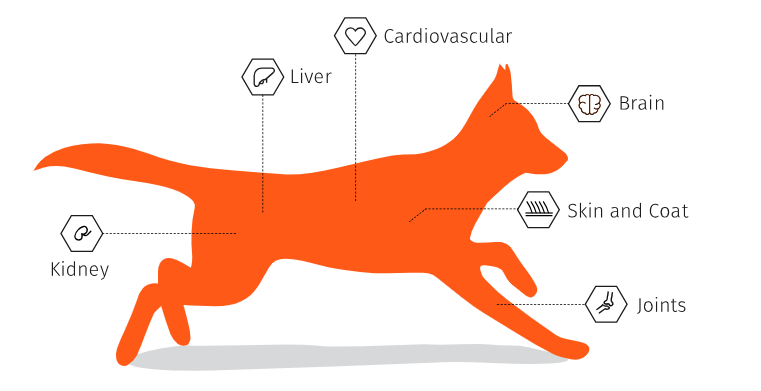However, it is equally important to understand that not all omega-3s are the same.
To determine the most beneficial omega-3 source for pets, it's first important to know the differences between plant-based and marine omega-3s.
So, let's explore these differences and discover which source is best for our furry friends.
The two most important omega-3 sources
To begin with, it is important to understand the fact that omega-3 fatty acids predominantly come from two sources - marine organisms like krill, which are rich in EPA and DHA, and plant sources such as flaxseed, which are rich in ALA.
Plant-based omega-3: A closer look
Plant-based sources like flaxseed, walnuts, rapeseed, and chia seeds, contain omega-3 fatty acids in the form of alpha-linolenic acid (ALA).
For ALA to benefit a pet's health, it must go through a series of complex metabolic reactions to convert into EPA and DHA which are anti-inflammatory.
Unfortunately, this conversion process is naturally inefficient in dogs and cats.
Marine omega-3: The superior choice?
Marine omega-3s, such as those derived from fish, whales, seals, and algae are usually in the form of triglyceride-based EPA and DHA.
Krill, however, is a remarkable marine ingredient that is rich in phospholipid-based EPA and DHA. Known as the "molecules of life", phospholipids play a crucial role as natural, integral parts of all human and animal cells.
These phospholipids make it easy for pets to absorb and integrate the omega-3s from krill into their vital organs, where they maintain the strength, flexibility, and integrity of the body cells.

The seven vital organs that marine omega-3s can have a positive effect on
The health advantages of marine omega-3s
Marine omega-3s offer many health benefits, including:
Skin and coat health: Omega-3s can enhance skin hydration and reduce inflammatory reactions, and alter lipid composition in skin and fur cells.
- Cardiovascular health: EPA/DHA modifies blood TG, HDL cholesterol, plaque development, heart rate, and heart muscle functions to reduce cardiovascular risks.
- Cognitive and visual development: DHA is vital for brain and eye development by being an important building block for the eye, cognitive and behavioral function. EPA and DHA are vital for reducing inflammation in brain tissue and diminishing the amount of neuronal loss in aging.
- Liver functionality: Omega-3s aid in lipid breakdown to prevent fatty liver, enhance insulin sensitivity, and have anti-inflammatory effects in the liver.
- Kidney support: EPA and DHA promote healthy kidney function by inhibiting inflammation and reducing blood pressure. EPA reduces the production of omega-6-derived pro-inflammatory signaling molecules.
- Joint health: Omega-3s reduce mobility issues and joint pain by inhibiting inflammation. EPA and DHA also reduce pro-inflammatory signaling molecules and occupy the same enzymes that painkillers (NSAIDs) block to give pain relief.
Recent research insights
Recent research, including a study by Aker BioMarine on Alaskan Huskies, has shown the superior efficacy of marine-based omega-3s over plant-based sources in raising the omega-3 index, a measure of EPA and DHA levels in red blood cell membranes.
More than this, a new study conducted by the Swedish University of Agricultural Sciences and Aker BioMarine wanted to determine what is the most effective source of omega-3 for pets. The research involved 45 Alaskan Husky sled dogs over four weeks and tested three different omega-3 sources: krill meal, fish meal, and flaxseed, each at similar inclusion levels in the Huskies' diet.
The findings were clear: krill meal significantly outperformed the other sources, even at a lower inclusion level of 3%, raising the omega-3 levels in the dogs from 1.3% to an average of 2.4%. Fish meal followed, increasing the levels from 1.3% to 1.9%, while flaxseed showed no significant impact.
Scientist Hanna Lindqvist concluded that the type of omega-3 added to pet diets does matter, and krill meal proved to be a more powerful ingredient, even in smaller quantities, demonstrating its potential to enhance the health benefits of omega-3 in pets.
"The type of omega-3 added to pet diets does matter, and the phospholipid omega-3 in krill appears to be more effective than triglyceride omega-3 from fish or alpha-linolenic acid from flaxseed."
Krill: A source for many other nutrients
Not only is krill a great source of marine omega-3s, but it's also a great source of other essential nutrients, including marine proteins, choline, and astaxanthin.
Moreover, Antarctic krill stands out as one of the most sustainable sources of marine omega-3s globally. Its sustainability factor adds to its appeal, making it an excellent choice for pet owners who prioritize both the health of their furry friends and the well-being of our planet.
By: Qrill PET
You could be interested: Greenwashing in pet food: what it is and how to avoid it






































